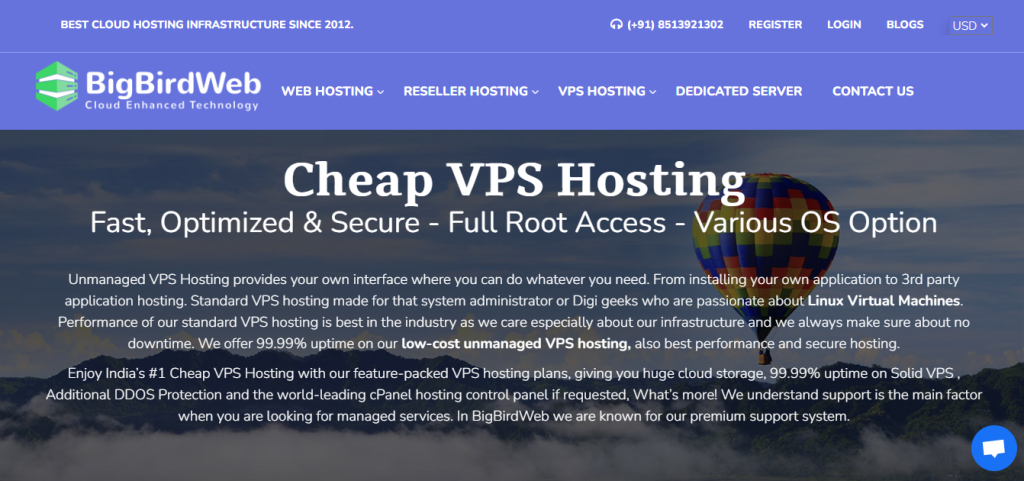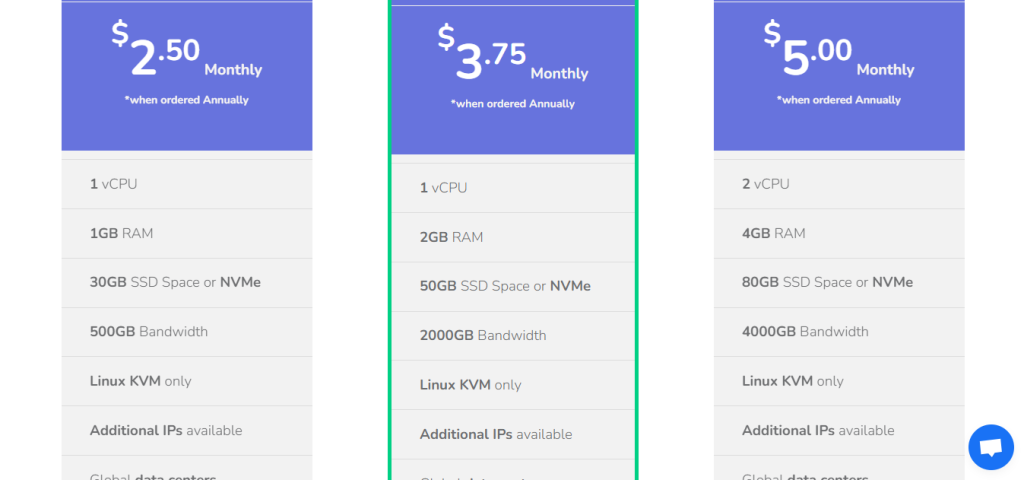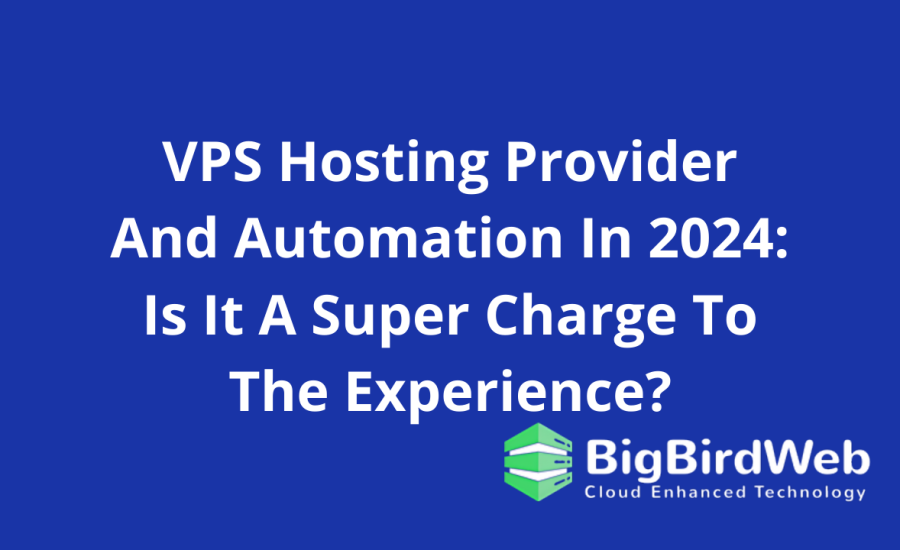Explore the role of automation in enhancing the efficiency and management of your VPS hosting provider. Learn how automation can streamline operations, improve performance, and reduce costs
In the rapidly evolving world of web hosting, automation has become a game-changer for VPS hosting provider services. By integrating automation into their offerings, VPS hosting provider companies can enhance operational efficiency, improve performance, and provide a better experience for their clients. This blog delves into how automation is transforming the landscape of VPS hosting provider services and explores its many benefits.

Table of Contents
Understanding Automation in VPS Hosting Provider Services

Before diving into the specifics, it’s essential to grasp what automation means in the context of a VPS hosting provider. Automation involves using technology to perform tasks without human intervention. In VPS hosting provider services, this can range from managing server configurations to handling updates and scaling resources.
Key Areas of Automation in VPS Hosting Provider Services
- Provisioning and Deployment: Automating the setup and deployment of virtual private servers.
- Monitoring and Maintenance: Automated monitoring tools and maintenance scripts.
- Scaling and Load Balancing: Automatically adjusting resources based on demand.
- Backup and Recovery: Automated backup processes and recovery solutions.
- Security and Compliance: Automating security measures and compliance checks. You can also opt for free web hosting.
Provisioning and Deployment
Automating the provisioning and deployment of virtual private servers (VPS) is one of the primary benefits offered by a VPS hosting provider. This process involves setting up new servers, configuring them, and deploying applications—all of which can be streamlined through automation.
How Automation Improves Provisioning
- Faster Setup: Automation reduces the time required to set up a new VPS, allowing for rapid deployment of resources.
- Consistency: Automated scripts ensure that servers are configured consistently, minimizing human error.
- Scalability: Automation makes it easier to scale up or down based on demand, without manual intervention.
Tools for Automated Provisioning
- Cloud Management Platforms: Tools like AWS CloudFormation and Microsoft Azure Resource Manager help automate the provisioning of cloud resources.
- Configuration Management Tools: Ansible, Puppet, and Chef automate the configuration and management of servers.
Monitoring and Maintenance

Effective monitoring and maintenance are critical for ensuring the reliability and performance of VPS hosting provider services. Automation in these areas helps to proactively manage server health and address issues before they impact users.
Benefits of Automated Monitoring
- Real-Time Alerts: Automated monitoring tools provide real-time alerts for performance issues, outages, or security breaches.
- Proactive Maintenance: Automation schedules regular maintenance tasks, such as software updates and security patches.
- Performance Optimization: Monitoring tools automatically analyze server performance and suggest optimizations.
Popular Monitoring Tools
- Nagios: Provides comprehensive monitoring and alerting for servers, networks, and applications.
- Zabbix: Offers advanced monitoring capabilities and customizable dashboards.
- Prometheus: Focuses on metrics collection and querying, integrated with Grafana for visualization.
Scaling and Load Balancing
Scaling and load balancing are essential for managing traffic and ensuring that applications remain responsive. Automation simplifies these processes, allowing for dynamic adjustments based on real-time demand.
Automated Scaling
- Horizontal Scaling: Add or remove VPS instances based on traffic or workload, without manual intervention.
- Vertical Scaling: Adjust the resources (CPU, memory) allocated to a single VPS to handle increased demand.
Load Balancing
- Traffic Distribution: Automated load balancers distribute incoming traffic across multiple VPS instances to prevent any single server from becoming overwhelmed.
- Health Checks: Load balancers perform health checks to ensure that traffic is only directed to healthy servers.
Tools for Scaling and Load Balancing
- AWS Auto Scaling: Automatically scales your EC2 instances based on traffic and load.
- Google Cloud Load Balancing: Distributes traffic across multiple instances and provides automatic scaling.
- Kubernetes: Manages containerized applications and handles scaling and load balancing automatically.
Backup and Recovery
Data backup and recovery are crucial components of any VPS hosting provider service. Automation in this area ensures that backups are performed regularly and recovery processes are streamlined.
Automated Backup Benefits
- Scheduled Backups: Automation allows for regular, scheduled backups without manual intervention.
- Incremental Backups: Automated systems can perform incremental backups, saving only the changes since the last backup.
- Easy Recovery: Automated recovery tools streamline the process of restoring data in case of a failure.
Backup and Recovery Tools
- Veeam Backup & Replication: Provides automated backup and recovery solutions for virtualized environments.
- Acronis Backup: Offers automated backup, disaster recovery, and file synchronization.
- R1Soft Server Backup: Provides continuous data protection and automated backup solutions.
Security and Compliance
Security and compliance are paramount for any VPS hosting provider. Automation helps enforce security policies and ensures that compliance requirements are met.
Automated Security Measures
- Patch Management: Automated systems apply security patches and updates to keep software up-to-date.
- Vulnerability Scanning: Regular automated scans identify and address potential security vulnerabilities.
- Access Control: Automation enforces access control policies, ensuring that only authorized users can access sensitive data.
Compliance Automation
- Regulatory Compliance: Automated tools help ensure that your VPS hosting provider adheres to regulatory standards, such as GDPR or HIPAA.
- Audit Trails: Automated logging and reporting provide detailed audit trails for compliance audits.
Security Tools
- Splunk: Offers security information and event management (SIEM) with automated threat detection and response.
- Qualys: Provides automated vulnerability management and compliance solutions.
- Sysdig: Delivers automated security and monitoring for containerized environments.
Case Studies: Automation Success Stories
Case Study 1: E-Commerce Platform
An e-commerce platform faced challenges with server provisioning and scaling during peak shopping seasons. By integrating automation into their VPS hosting provider services, they achieved:
- Faster Provisioning: Automated scripts reduced the time required to set up new servers from hours to minutes.
- Dynamic Scaling: The platform could automatically scale resources based on traffic, ensuring a seamless shopping experience during high-demand periods.
Case Study 2: SaaS Provider
A SaaS provider struggled with maintaining server health and performance. Automation helped them by:
- Proactive Monitoring: Automated monitoring tools provided real-time alerts and performance insights, allowing for timely issue resolution.
- Scheduled Maintenance: Automated maintenance tasks ensured that software updates and security patches were applied regularly, without manual effort.
Conclusion
Automation is transforming the way VPS hosting provider services are delivered, offering enhanced efficiency, performance, and reliability. By automating tasks related to provisioning, monitoring, scaling, backup, security, and compliance, VPS hosting provider companies can provide a superior experience for their clients while reducing operational costs. Embracing automation is not just a trend but a strategic move towards optimizing your hosting environment and staying competitive in a rapidly evolving market.
FAQs
1. What is the role of automation in VPS hosting provider services?
Automation in VPS hosting provider services streamlines various processes such as provisioning, monitoring, scaling, backup, and security. It improves efficiency, reduces manual effort, and enhances overall performance.
2. How does automated provisioning benefit VPS hosting provider services?
Automated provisioning speeds up the setup and deployment of new virtual private servers, ensures consistent configurations, and allows for scalable resource management based on demand.
3. What tools are commonly used for automated monitoring in VPS hosting provider services?
Common tools for automated monitoring include Nagios, Zabbix, and Prometheus. These tools provide real-time alerts, performance analysis, and proactive maintenance.
4. How does automated scaling work for VPS hosting provider* services?
Automated scaling adjusts resources based on real-time demand. It can involve adding or removing VPS instances (horizontal scaling) or adjusting resource allocation for existing instances (vertical scaling).
5. What are the benefits of automated backup solutions for VPS hosting provider services?
Automated backup solutions provide scheduled backups, incremental data storage, and streamlined recovery processes, ensuring data protection and quick recovery in case of failures.
6. How does automation help with security in VPS hosting provider services?
Automation enforces security measures such as patch management, vulnerability scanning, and access control. It ensures timely updates and compliance with security policies.
7. What are some popular tools for automated backup and recovery?
Popular tools for automated backup and recovery include Veeam Backup & Replication, Acronis Backup, and R1Soft Server Backup. These tools offer reliable and efficient backup solutions.
8. Can automation improve compliance for VPS hosting provider services?
Yes, automation helps with regulatory compliance by enforcing policies, conducting automated scans, and providing detailed audit trails for compliance audits.
9. How does automated load balancing benefit VPS hosting provider services?
Automated load balancing distributes incoming traffic across multiple VPS instances, preventing any single server from becoming overwhelmed and ensuring high availability and performance.
10. What are some examples of automation success stories in VPS hosting provider services?
Examples include e-commerce platforms that achieve faster provisioning and dynamic scaling during peak seasons, and SaaS providers that benefit from proactive monitoring and scheduled maintenance.
By leveraging automation, VPS hosting provider companies can enhance their services, offering greater efficiency and reliability. Embracing these advanced techniques will not only streamline operations but also
Bonus Content: The Future of Automation in VPS Hosting Provider Services

As the web hosting industry continues to evolve, the role of automation in VPS hosting provider services is becoming increasingly significant. The future of automation promises even greater advancements in efficiency, security, and user experience. This bonus content explores emerging trends and technologies that will shape the future of automation in VPS hosting provider services.
Artificial Intelligence and Machine Learning
Artificial Intelligence (AI) and Machine Learning (ML) are set to revolutionize VPS hosting provider services by enabling more intelligent and predictive automation.
AI-Driven Resource Management
AI algorithms can analyze usage patterns and predict future resource needs, enabling more efficient resource allocation and scaling.
- Predictive Scaling: AI can predict traffic spikes and automatically scale resources in advance to handle increased load.
- Optimized Resource Allocation: AI can optimize the allocation of resources based on real-time data, ensuring efficient utilization.
Intelligent Monitoring and Alerts
AI and ML can enhance monitoring tools by providing more accurate and actionable insights.
- Anomaly Detection: AI can detect anomalies in server performance and traffic patterns, alerting administrators to potential issues before they escalate.
- Automated Incident Response: ML algorithms can recommend or even execute automated responses to common issues, reducing downtime.
Serverless Architectures
Serverless computing is an emerging trend that allows developers to focus on code without worrying about server management. While traditionally associated with cloud functions, serverless architectures are beginning to influence VPS hosting provider services as well.
Benefits of Serverless for VPS Hosting
- Reduced Management Overhead: Serverless architectures eliminate the need for server management, allowing providers to focus on delivering better services.
- Cost Efficiency: Pay-as-you-go pricing models ensure that users only pay for the resources they actually use.
- Scalability: Serverless platforms can automatically scale to handle varying loads without manual intervention.
Automation in DevOps
DevOps practices are integral to modern software development, and automation plays a crucial role in this domain. VPS hosting provider services are increasingly integrating DevOps automation to streamline development and deployment processes.
Continuous Integration and Continuous Deployment (CI/CD)
Automating CI/CD pipelines allows for faster and more reliable software releases.
- Automated Testing: Automated tests ensure that code changes do not introduce new issues.
- Automated Deployment: CI/CD tools automatically deploy new versions of applications to production environments, reducing the risk of human error.
Infrastructure as Code (IaC)
IaC tools like Terraform and Ansible enable the automation of infrastructure management through code.
- Consistent Environments: IaC ensures that development, staging, and production environments are consistent, reducing the risk of deployment issues.
- Version Control: Infrastructure configurations can be version-controlled, allowing for easy rollback and auditing.
Enhanced Security Automation
As cyber threats become more sophisticated, VPS hosting provider services are leveraging automation to enhance security measures.
Automated Threat Detection and Response
AI and ML can detect and respond to security threats in real-time.
- Behavioral Analysis: AI analyzes user behavior to detect suspicious activities and potential security breaches.
- Automated Mitigation: Automated systems can take immediate action to mitigate threats, such as blocking suspicious IP addresses or isolating compromised servers.
Compliance Automation
Automation helps ensure that VPS hosting provider services comply with industry regulations and standards.
- Continuous Compliance Monitoring: Automated tools continuously monitor for compliance with regulatory requirements, such as GDPR or HIPAA.
- Automated Reporting: Compliance reports can be generated automatically, reducing the administrative burden.
Edge Computing
Edge computing is another trend that is influencing VPS hosting provider services. By processing data closer to the source, edge computing reduces latency and improves performance.
Benefits of Edge Computing
- Reduced Latency: Processing data at the edge reduces the distance data must travel, resulting in lower latency and faster response times.
- Improved Performance: Edge computing enhances the performance of applications that require real-time data processing, such as IoT and augmented reality.
Automation in Customer Support
Automation is also transforming customer support in VPS hosting provider services, providing faster and more efficient assistance to users.
AI-Powered Chatbots
AI-powered chatbots can handle common support queries, providing instant responses and reducing the workload on human support agents.
- 24/7 Support: Chatbots provide round-the-clock support, ensuring that users can get assistance at any time.
- Instant Responses: AI chatbots can provide instant responses to common questions, improving user satisfaction.
Automated Ticketing Systems
Automated ticketing systems streamline the support process by categorizing and prioritizing support requests.
- Efficient Ticket Management: Automation ensures that support tickets are routed to the appropriate departments or agents, reducing response times.
- Priority Handling: Automated systems can prioritize urgent issues, ensuring that critical problems are addressed promptly.
Future Trends in Automation for VPS Hosting Provider Services
As technology continues to advance, several trends are poised to further transform automation in VPS hosting provider services.
Blockchain for Enhanced Security
Blockchain technology offers potential applications in enhancing the security and transparency of VPS hosting provider services.
- Decentralized Security: Blockchain can provide a decentralized approach to security, reducing the risk of centralized attacks.
- Immutable Audit Trails: Blockchain’s immutable nature ensures that audit trails are tamper-proof, enhancing transparency and compliance.
Quantum Computing
While still in its early stages, quantum computing holds the potential to revolutionize automation and computing power.
- Faster Data Processing: Quantum computers can process data exponentially faster than traditional computers, enabling more efficient automation.
- Advanced Encryption: Quantum computing could lead to the development of more secure encryption methods, enhancing data security.
Conclusion
The future of automation in VPS hosting provider services is bright, with emerging technologies and trends poised to further enhance efficiency, security, and user experience. By embracing AI, serverless architectures, DevOps automation, enhanced security measures, edge computing, and advanced customer support, VPS hosting provider companies can stay ahead of the curve and continue to provide top-notch services to their clients. As these technologies evolve, the potential for automation to transform the hosting industry will only grow, making it an exciting time for VPS hosting provider services and their users.
FAQs
1. What is the future of automation in VPS hosting provider services?
The future of automation in VPS hosting provider services includes advancements in AI, serverless architectures, DevOps practices, enhanced security measures, edge computing, and improved customer support.
2. How can AI and ML improve VPS hosting provider services?
AI and ML can enhance resource management, monitoring, and incident response by predicting resource needs, detecting anomalies, and automating responses to common issues.
3. What is the impact of serverless architectures on *VPS hosting provider* services?*
Serverless architectures reduce management overhead, improve cost efficiency, and provide seamless scalability, allowing providers to focus on delivering better services.
4. How does automation benefit DevOps practices in VPS hosting provider services?
Automation in DevOps enables faster and more reliable software releases through automated testing, deployment, and infrastructure management.
5. What are some advanced security measures in VPS hosting provider services?
Advanced security measures include automated threat detection and response, behavioral analysis, and continuous compliance monitoring.
6. How does edge computing enhance VPS hosting provider services?
Edge computing reduces latency and improves performance by processing data closer to the source, benefiting applications that require real-time data processing.
7. How is automation transforming customer support in VPS hosting provider services?
Automation in customer support includes AI-powered chatbots and automated ticketing systems, providing faster and more efficient assistance to users.
8. What role does blockchain play in the future of VPS hosting provider services?
Blockchain technology offers potential applications in enhancing security and transparency through decentralized security and immutable audit trails.
9. How could quantum computing impact VPS hosting provider services?
Quantum computing could revolutionize automation and computing power by enabling faster data processing and more secure encryption methods.
10. What are the benefits of automated scaling in VPS hosting provider services?
Automated scaling adjusts resources based on real-time demand, ensuring efficient resource utilization and preventing performance bottlenecks.
